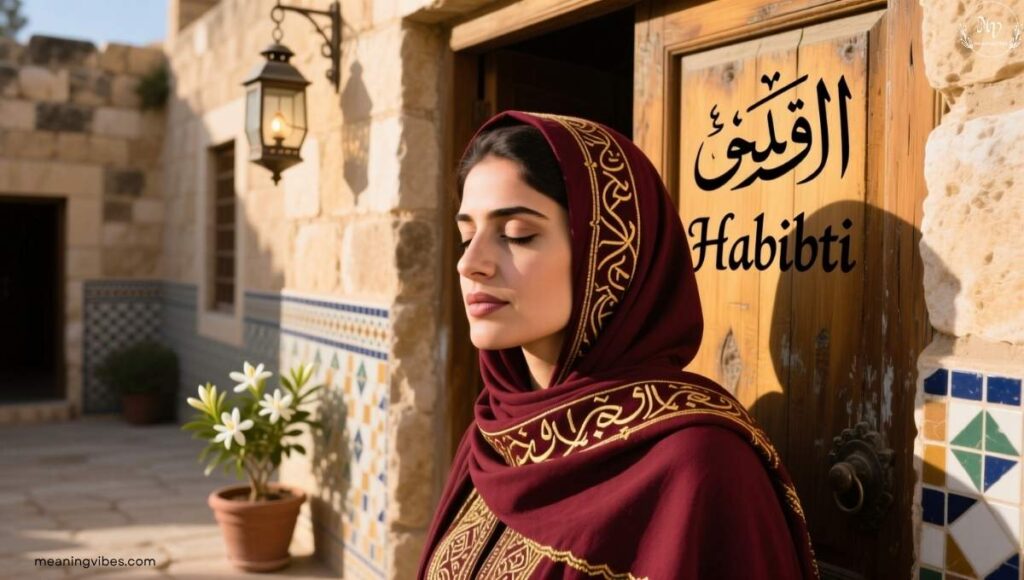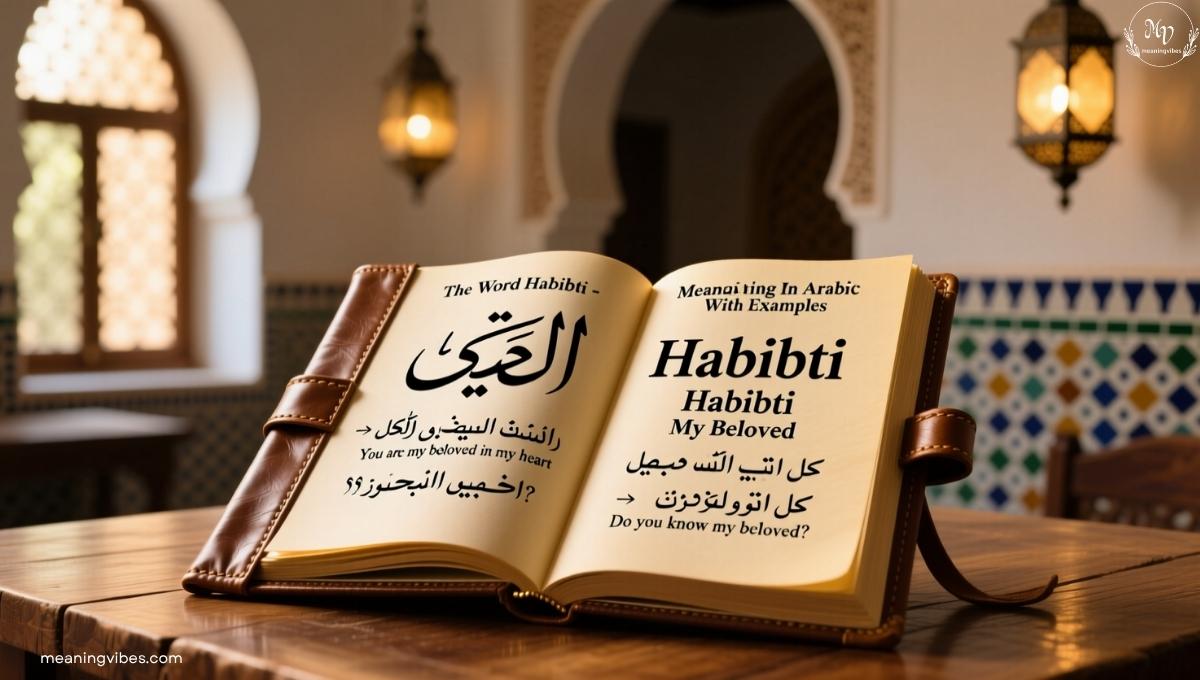Ever heard someone say Habibti Meaning in Arabic and felt curious about its warmth and sweetness? Maybe you’ve seen it in Arabic songs or movies but weren’t sure of the real habibti meaning. You might even have typed “habibti in Arabic” or “habibti Arabic” (or “habibiti” by mistake) trying to figure it out. You’re not alone , many people want to know what this lovely word truly means.
In this post, you’ll discover the real Habibti Meaning in Arabic , its origin, emotional depth, and how it’s used in everyday conversations. You’ll also learn simple examples and cultural insights to help you use it naturally and confidently.
The Meaning of “Habibti” in Arabic
The word habibti (حبيبتي) means “my beloved” or “my dear” when speaking to a female. It comes from the Arabic root ḥ-b-b (حبّ), which means love.
- Habibti in Arabic = “My beloved (female)”
- Habibi in Arabic = “My beloved (male)”
So, when you say habibti, you’re expressing affection toward a woman , a wife, girlfriend, daughter, sister, or even a close friend.
Everyday Usage Example
Arabic speakers use habibti naturally, much like English speakers use “sweetheart” or “darling.”
For example:
- A mother might say, “Come here, habibti,” to her daughter.
- A man might say, “Good morning, habibti,” to his wife.
In short, habibti meaning is more than a translation , it’s a term of endearment filled with emotion and care.
Linguistic Root and Grammatical Usage
Understanding the root of habibti helps explain its structure.
| Arabic Word | Gender | Meaning | Root Letters |
| Habibi (حبيبي) | Masculine | My beloved (male) | H-B-B |
| Habibti (حبيبتي) | Feminine | My beloved (female) | H-B-B |
The Root “H-B-B”
The Arabic triliteral root H-B-B (حبّ) forms many love-related words:
- Hubb – love
- Habib – beloved
- Mahboub – loved one
When you add -ti (ـتي) at the end, it indicates the feminine possessive form , meaning “my (female) beloved.”
So, habibti in Arabic grammatically translates to “my beloved woman.”
How to Use Habibti Naturally in Conversations

Using habibti in everyday talk is simple once you understand the context. You can say it warmly to a close friend, family member, or partner. For example, “Thank you, habibti,” shows love and appreciation. The Habibti Meaning in Arabic expresses affection, not formality. Always use it kindly and with genuine emotion.
In friendly chats, habibti sounds natural and caring. You might hear women say it to other women as a sign of closeness. Just remember that habibti Arabic is personal, so avoid using it with strangers or in serious professional settings.
Examples of “Habibti” in Arabic Sentences
Let’s look at some real examples of habibti usage in Arabic sentences.
| Arabic Sentence | English Translation |
| صباح الخير يا حبيبتي | Good morning, my love |
| أحبكِ يا حبيبتي | I love you, my darling |
| اشتقت لكِ يا حبيبتي | I miss you, my beloved |
| شكراً لكِ يا حبيبتي | Thank you, my dear |
| أين أنتِ يا حبيبتي؟ | Where are you, my sweetheart? |
As you can see, habibti Arabic is used directly to express love, affection, or care. It’s versatile , fitting for romantic, familial, or friendly contexts depending on tone.
Cultural or Quranic Significance of “Habibti”
In Arab culture, language and love are deeply connected. Habibti isn’t just a romantic term; it’s also a way of showing warmth and emotional closeness.
Cultural Meaning
- In families: Mothers, aunts, and grandmothers often call younger girls “habibti.”
- Among friends: Women may say “habibti” to express affection or gratitude.
- In relationships: Men use it lovingly for their wives or girlfriends.
Quranic and Islamic Connection
While the word habibti itself doesn’t appear in the Qur’an, its root “Hubb” (love) does many times. The Qur’an uses it to describe God’s love for His creation and the love between believers.
For instance:
“Indeed, Allah loves those who do good.” (Surah Al-Baqarah 2:195)
The spiritual concept of love (hubb) is divine, making habibti a culturally and emotionally significant expression even in Islamic contexts.
Common Misunderstandings or Mistakes
Many Arabic learners confuse habibi and habibti. Let’s clarify some of the most common errors.
Common Confusions
| Mistake | Why It’s Wrong | Correct Form |
| Saying “habibi” to a woman | “Habibi” is masculine | Say habibti |
| Writing “habibiti” | Spelling error (extra “i”) | Correct: habibti |
| Using “habibti” formally | It’s too affectionate | Use only in close contexts |
Quick Tips
- Use habibti only with people you’re close to.
- Avoid using it with strangers or in professional settings.
- Remember: habibi (to a man), habibti (to a woman).
So next time someone says “habibi vs habibti,” you’ll know the difference!
Emotional and Cultural Power Behind the Word Habibti

The Habibti Meaning in Arabic carries more than simple translation , it reflects a deep cultural emotion. Arabs use habibti to show warmth, loyalty, and respect. Whether spoken between family or lovers, it makes the listener feel valued.
Emotionally, habibti is more than a word , it’s a connection. It reminds people of home, love, and belonging. Many learners search “habibti in Arabic” to feel this emotional side of language. The gentle sound of habibti or even habibiti expresses the universal message of affection shared across all cultures.
Why You Should Learn “Habibti”
Learning words like habibti opens the door to understanding Arabic culture and emotions. It’s more than vocabulary , it’s connection.
1. Deepens Cultural Understanding
Arabic is full of affectionate words. Knowing how and when to say habibti helps you sound warm and natural.
2. Improves Arabic Communication
Using habibti correctly builds rapport with native speakers. It shows respect for cultural nuances.
3. Makes Learning Fun
Arabic isn’t just grammar , it’s feeling. Words like habibti, habibi, and hubb make learning enjoyable and relatable.
Additional Notes: Arabic Love Words
Here’s a table of similar affectionate expressions in Arabic:
| Arabic Word | English Meaning | Gender | Context |
| Habibi | My beloved | Masculine | Romantic/Friendly |
| Habibti | My beloved | Feminine | Romantic/Friendly |
| Ya Amar | My moon | Unisex | Romantic |
| Ya Albi | My heart | Unisex | Deep affection |
| Ya Rohi | My soul | Unisex | Spiritual/Loving |
Learning these helps you sound more natural in Arabic conversations and express feelings more precisely.
Habibti Meaning in Arabic at meaningvibes.com
At meaningvibes.com, you’ll find detailed explanations about Arabic words and phrases, including the habibti meaning and its cultural impact.
The site explores:
- Arabic love expressions and their origins
- How habibti Arabic fits into everyday speech
- Lessons for Arabic for beginners
- Guidance on Arabic grammar feminine forms
So, if you’re eager to learn Arabic online, explore resources at meaningvibes.com for interactive lessons on habibti, habibi, and more.
Frequently Asked Questions
What is the Habibti Meaning in Arabic?
The Habibti Meaning in Arabic is “my beloved” or “my dear” when addressing a woman lovingly.
How do you pronounce Habibti in Arabic?
You pronounce Habibti in Arabic as “ha-beeb-tee,” showing love and affection toward a female.
What’s the difference between Habibi and Habibti?
The Habibti Meaning in Arabic is feminine, while Habibi is the masculine version for men.
Is Habibti used only in romantic relationships?
No, Habibti Meaning in Arabic can also be used for daughters, sisters, and close female friends.
What is the origin of Habibti in Arabic?
The Habibti Meaning in Arabic comes from the root “H-B-B,” which means love or affection.
Can non-Arabic speakers use the word Habibti?
Yes, anyone can say Habibti Meaning in Arabic to express affection, care, or warmth toward women.
Why is Habibti Meaning in Arabic so popular worldwide?
Because Habibti Meaning in Arabic sounds emotional, beautiful, and expresses universal love across many cultures.
Conclusion
The Habibti Meaning in Arabic shows how one simple word can carry deep love and warmth. People use habibti to show care, respect, and closeness toward women they value. You’ll hear it in songs, daily talk, and family moments. The habibti meaning is not just about romance , it’s about connection and kindness. Many learners type “habibti in Arabic” or “habibti Arabic” to understand how to use it right.
Learning the Habibti Meaning in Arabic helps you speak with emotion and cultural respect. It’s a small word with a big heart. Whether you say habibti to your friend or loved one, it always sounds warm and genuine. Even if you spell it as habibiti, the feeling stays the same. Knowing the Habibti Meaning in Arabic brings you closer to the language and its beautiful expressions.

I’m the creator of meaningvibes.com, sharing positivity and purpose for over 3 years. With 50+ happy clients, I help people and brands find the right words, deep meanings, and good vibes that truly connect.








